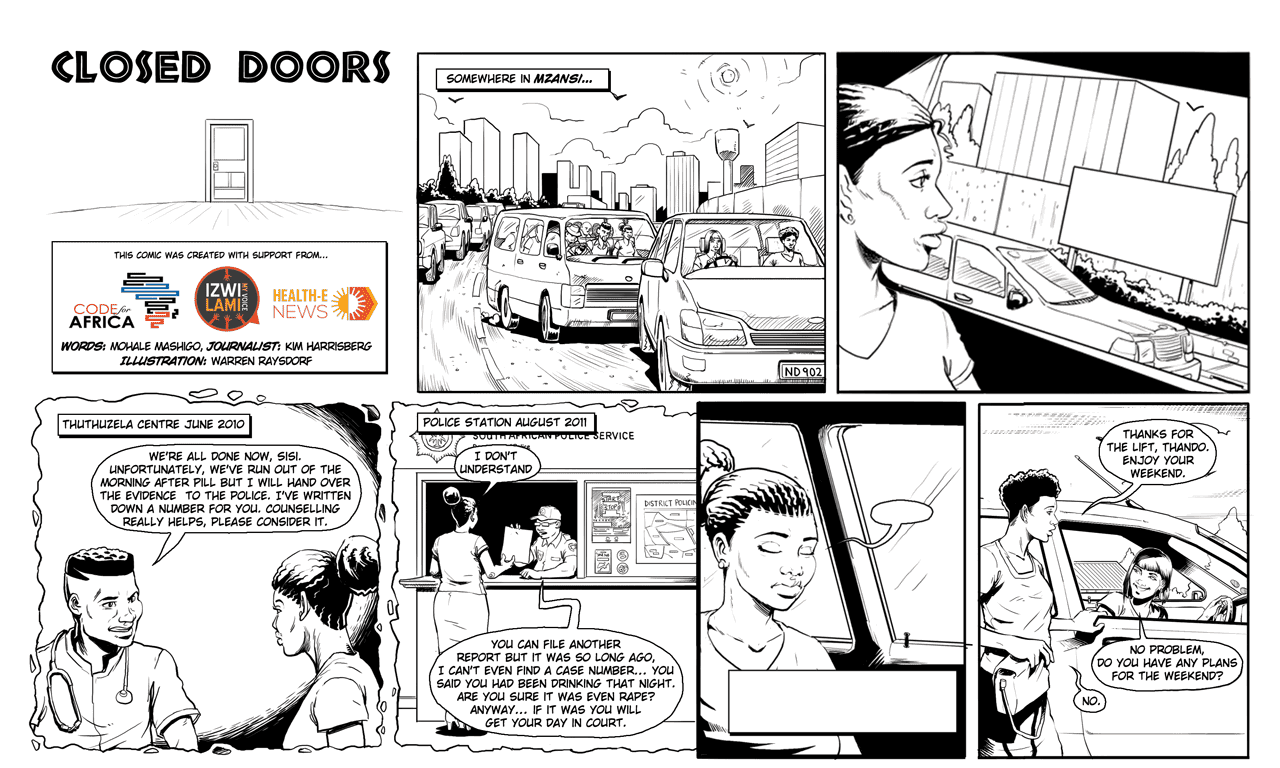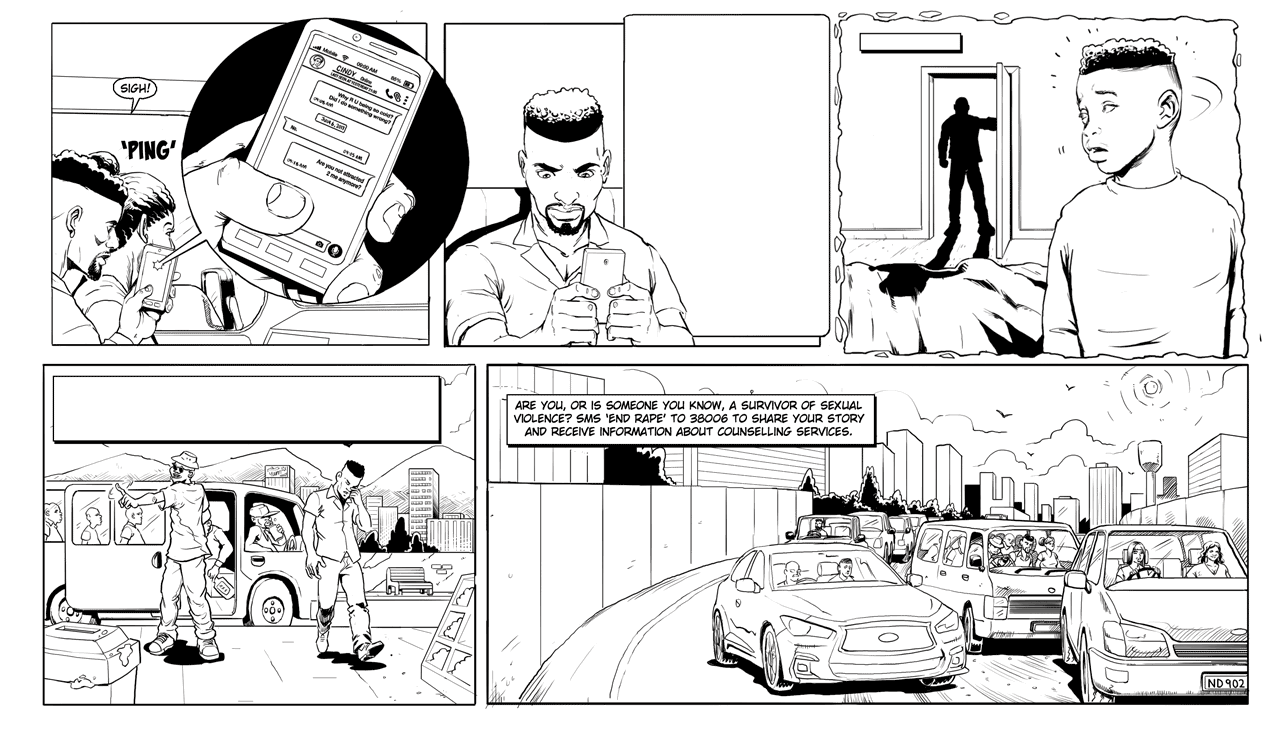ILLUSTRATION: Closed Doors for Rape Survivors

Rape in South Africa is a daily occurrence. According to the 2015/2016 South African Police Service figures released in September last year, reported rape cases stood at 42,496. This does not include the unimaginable, alarming number of cases that go unreported, with many rape survivors deterred by the 8 percent conviction rate of rapists, or the notorious disregard of the SAPS towards sexual violence survivors.
“Fear of not being believed, or being told that what they survived does not actually amount to rape, means many survivors do not know they are entitled to access both justice and medical care to prevent unwanted pregnancies, HIV and other sexually transmitted diseases.”
In a report published by Doctors Without Borders (MSF) that profiled the sexual violence in Rustenburg, it was found that 95 percent of survivors did not tell a health professional of the incident, while only half were aware that HIV could be prevented after rape.
In another more recent study, MSF conducted a nationwide telephonic mapping of designated healthcare facilities to examine what healthcare gaps existed for survivors of sexual violence in South Africa.
According to the Department of Health, there are 265 public healthcare facilities across all provinces that should be providing medical and psychological care to survivors of sexual violence. Of the 265 designated facilities, 63 percent participated in an interview. It was found that only 26,7 percent of facilities provide the comprehensive package of care for survivors.
This could be why one third of survivors interviewed in the Rustenburg study needed abortions after being raped. This means the trauma of being raped is repeated both in the pursuit of justice, and in the pursuit of basic access to healthcare post-rape.
Only 27 percent reported access to a psychologist, raising concerns about the ripple effect of trauma and mental health issues throughout South African society.
Additionally, for young South African women, gender-based violence attributes to approximately 20-25 percent of new HIV infections. This is exacerbated by poor healthcare services for survivors. A woman, for example, who cannot access antiretrovirals after a rape is at risk of having her trauma revisited through her life.
Health-e’s Izwi Lami campaign provides a free and anonymous SMS service to survivors, allowing them to share their stories of survival, access counselling services and sign a petition calling for packages of care in all 24-hour healthcare facilities. Largely, it has brought rape survivors’ testimonies into the mainstream media conversation in an attempt to shatter the normalisation of rape – and its long-term health implications – across the country.
Here is the full three part illustration produced by Health e-News:



Author
Republish this article
This work is licensed under a Creative Commons Attribution-NoDerivatives 4.0 International License.
Unless otherwise noted, you can republish our articles for free under a Creative Commons license. Here’s what you need to know:
You have to credit Health-e News. In the byline, we prefer “Author Name, Publication.” At the top of the text of your story, include a line that reads: “This story was originally published by Health-e News.” You must link the word “Health-e News” to the original URL of the story.
You must include all of the links from our story, including our newsletter sign up link.
If you use canonical metadata, please use the Health-e News URL. For more information about canonical metadata, click here.
You can’t edit our material, except to reflect relative changes in time, location and editorial style. (For example, “yesterday” can be changed to “last week”)
You have no rights to sell, license, syndicate, or otherwise represent yourself as the authorized owner of our material to any third parties. This means that you cannot actively publish or submit our work for syndication to third party platforms or apps like Apple News or Google News. Health-e News understands that publishers cannot fully control when certain third parties automatically summarise or crawl content from publishers’ own sites.
You can’t republish our material wholesale, or automatically; you need to select stories to be republished individually.
If you share republished stories on social media, we’d appreciate being tagged in your posts. You can find us on Twitter @HealthENews, Instagram @healthenews, and Facebook Health-e News Service.
You can grab HTML code for our stories easily. Click on the Creative Commons logo on our stories. You’ll find it with the other share buttons.
If you have any other questions, contact info@health-e.org.za.
ILLUSTRATION: Closed Doors for Rape Survivors
by kimharrisberg, Health-e News
March 9, 2018
MOST READ
No water no vote: Hammanskraal still doesn’t have clean drinking water a year after cholera outbreak
Cough syrup recall: What is diethylene glycol and what happens when you drink it?
Hunger and mental health: study looks at how families cope with food insecurity
Patients wait months for surgery at Leratong hospital as non-payment shuts down theatres
EDITOR'S PICKS
Related


Kenyan youth group fights trafficking through shared economic empowerment

